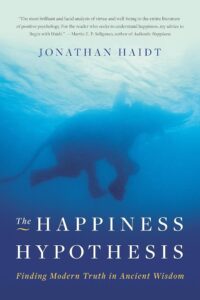“THE HAPPINESS HYPOTHESIS” by Jonathan Haidt
 I have read a lot of psychology books, but I have not written about them so far because:
I have read a lot of psychology books, but I have not written about them so far because:
- I did not understand all the concepts written by the author (it was the first reading).
- I needed to read them again and again.
- I had to read many other books to understand the concepts from the first book.
- I needed time to process the information.
This happened with Jonathan Haidt’s book “The Happiness Hypothesis.”
So, after eighteen years since I read the book for the first time, I was intrigued by this:
“People benefit from traumas, crises, and tragedies in three primary ways:
1. Rising to a challenge reveals your hidden abilities, and seeing these abilities changes your self-concept.
2. Adversity strengthens relationships and it opens people’s hearts to one another.
3. Trauma changes priorities and philosophies toward the present and toward other people.
The adversity theory has a weak and a strong version:
– in the weak version, adversity can lead to growth, strength, joy and self-improvement.
– in the strong version, people must endure adversity to grow, and the highest levels of growth and development are only open to those who have faced and overcome great adversity.
If the strong version of the hypothesis is valid, it has profound implications for how we should live our lives and structure our societies.
It means that we should take more chances and suffer more defeats.
It means that we might be dangerously overprotecting our children, offering them lives of bland safety and too much counseling while depriving them of the <<critical incidents>> that would help them to grow strong and to develop the most intense friendships.
It means that heroic societies, which fear dishonour more than death, or societies that struggle together through war, might produce better human beings than can a world of peace and prosperity in which people’s expectations rise so high that they sue each other for <<emotional damages>>.”
Publisher: BASIC BOOKS, 2006

Recent Comments